外研版(2019)必修第三册 Unit6 Disaster and hope Understanding ideas公开课课件(共44张PPT)
文档属性
| 名称 | 外研版(2019)必修第三册 Unit6 Disaster and hope Understanding ideas公开课课件(共44张PPT) | 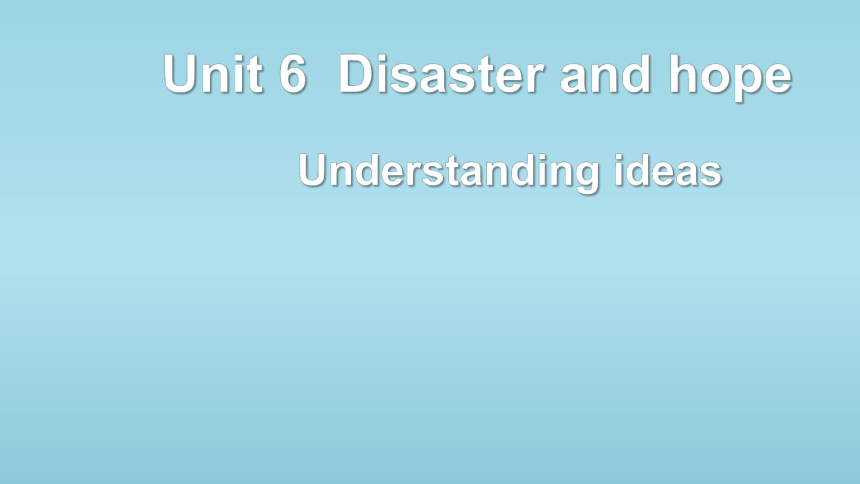 | |
| 格式 | pptx | ||
| 文件大小 | 3.5MB | ||
| 资源类型 | 教案 | ||
| 版本资源 | 外研版(2019) | ||
| 科目 | 英语 | ||
| 更新时间 | 2023-03-01 18:25:17 | ||
图片预览

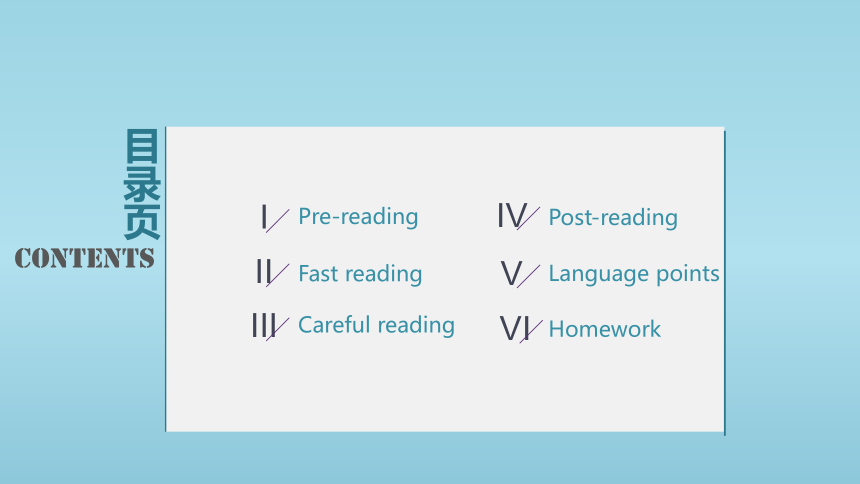

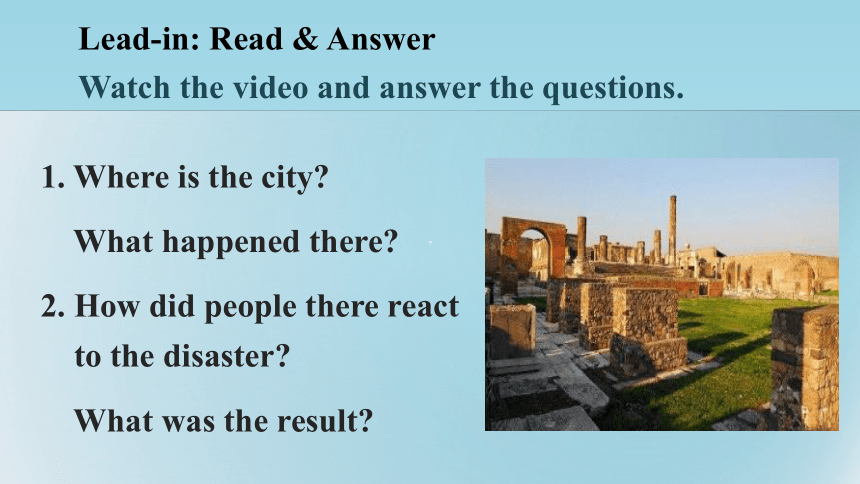
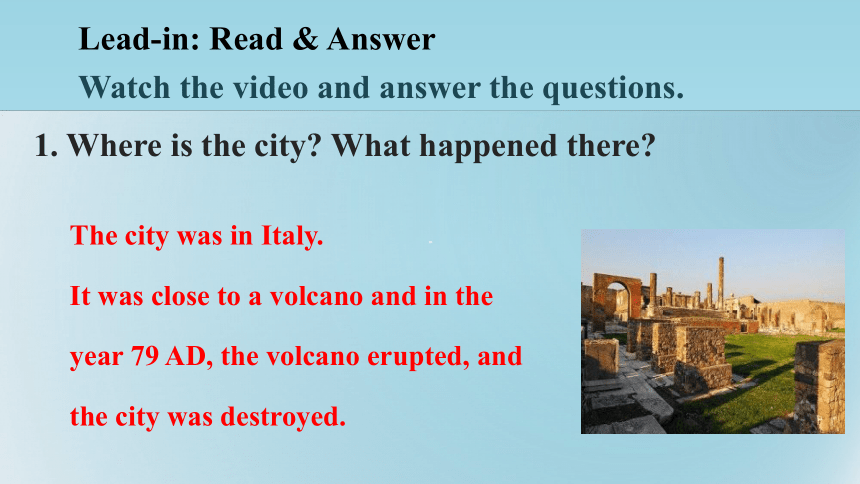
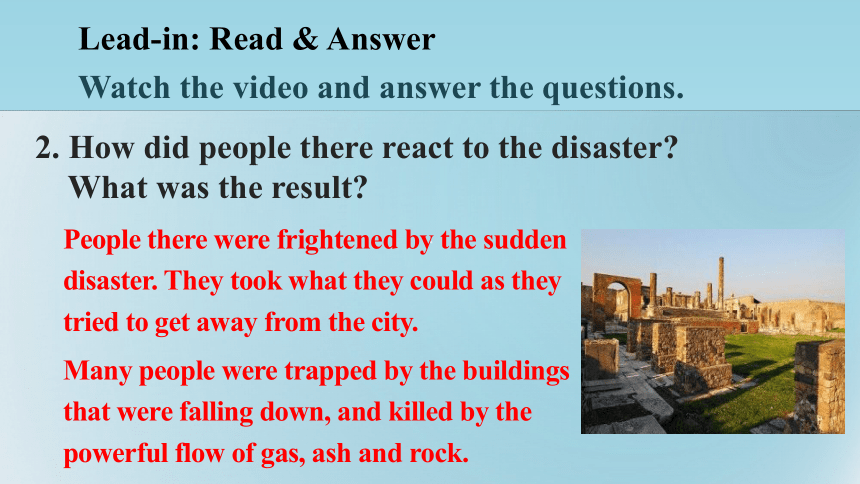
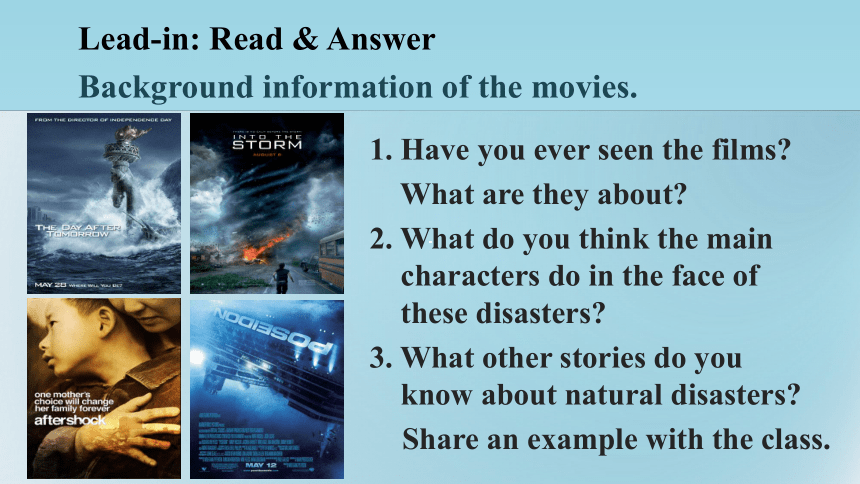
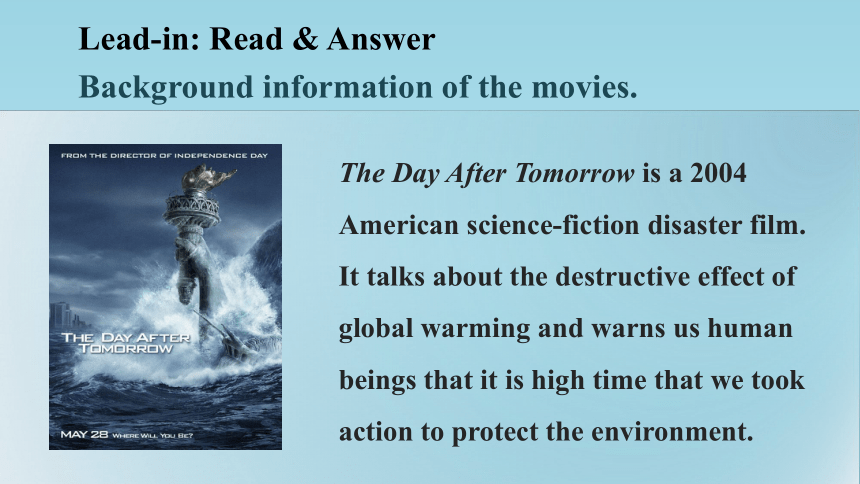
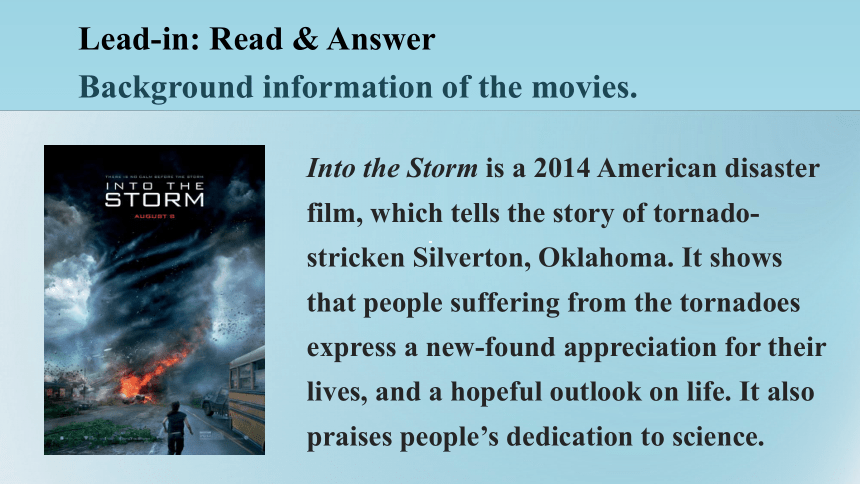
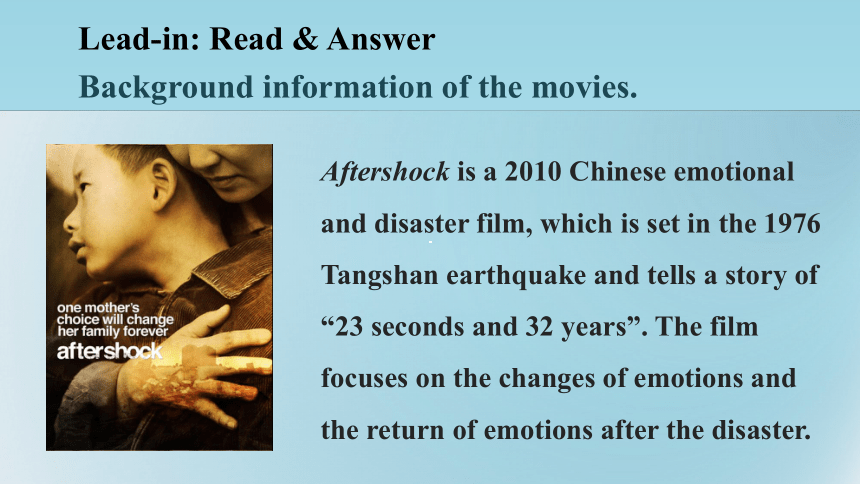
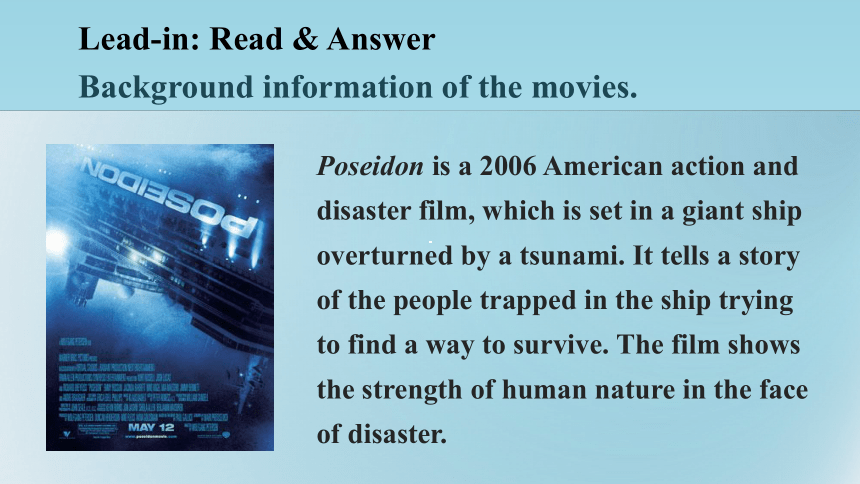
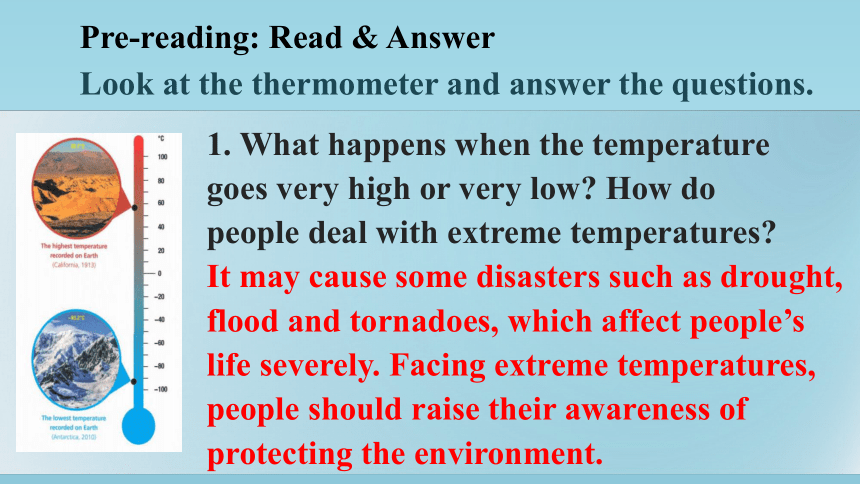
文档简介
(共44张PPT)
Understanding ideas
Unit 6 Disaster and hope
目录页
contents
Pre-reading
I
Language points
IV
Fast reading
II
Homework
V
Careful reading
III
VI
Post-reading
I
Pre-reading
Lead-in: Read & Answer
Watch the video and answer the questions.
1. Where is the city
What happened there
2. How did people there react
to the disaster
What was the result
Lead-in: Read & Answer
1. Where is the city What happened there
The city was in Italy.
It was close to a volcano and in the year 79 AD, the volcano erupted, and the city was destroyed.
Watch the video and answer the questions.
Lead-in: Read & Answer
2. How did people there react to the disaster
What was the result
People there were frightened by the sudden disaster. They took what they could as they tried to get away from the city.
Many people were trapped by the buildings that were falling down, and killed by the powerful flow of gas, ash and rock.
Watch the video and answer the questions.
Lead-in: Read & Answer
1. Have you ever seen the films
What are they about
2. What do you think the main
characters do in the face of
these disasters
3. What other stories do you
know about natural disasters
Share an example with the class.
Background information of the movies.
Lead-in: Read & Answer
The Day After Tomorrow is a 2004 American science-fiction disaster film. It talks about the destructive effect of global warming and warns us human beings that it is high time that we took action to protect the environment.
Background information of the movies.
Lead-in: Read & Answer
Into the Storm is a 2014 American disaster film, which tells the story of tornado-stricken Silverton, Oklahoma. It shows that people suffering from the tornadoes express a new-found appreciation for their lives, and a hopeful outlook on life. It also praises people’s dedication to science.
Background information of the movies.
Lead-in: Read & Answer
Aftershock is a 2010 Chinese emotional and disaster film, which is set in the 1976 Tangshan earthquake and tells a story of “23 seconds and 32 years”. The film focuses on the changes of emotions and the return of emotions after the disaster.
Background information of the movies.
Background information of the movies.
Lead-in: Read & Answer
Poseidon is a 2006 American action and disaster film, which is set in a giant ship overturned by a tsunami. It tells a story of the people trapped in the ship trying to find a way to survive. The film shows the strength of human nature in the face of disaster.
Look at the thermometer and answer the questions.
1. What happens when the temperature goes very high or very low How do people deal with extreme temperatures
It may cause some disasters such as drought, flood and tornadoes, which affect people’s life severely. Facing extreme temperatures, people should raise their awareness of protecting the environment.
Pre-reading: Read & Answer
2. What were the highest and lowest temperatures recorded where you live
How do you feel in extreme temperatures
In our city, according to the weather reports recorded, the highest temperature is 40.8℃ while the lowest is -13℃, which have a bad effect on our life and health.
Pre-reading: Read & Answer
Look at the thermometer and answer the questions.
II
Fast reading
Look at the picture and predict what the passage is about. Then read the passage and check your prediction.
The passage is about the author’s feelings and concerns on the London Tube on an unusually hot day.
Fast reading: Read & Answer
Fast reading: Background
The London Underground (also known as the “Underground” or “the Tube”) is a public transport system for London and its neighbouring areas. The underground is the world’s first underground railway. Opened in 1863, the network has 11 lines, making it one of the world’s busiest metro systems.
1. To explain why summers in London are getting hotter and hotter.
2. To complain about the London Tube.
3. To warn people about the danger of London being flooded.
4. To express his worries about the dangers of extreme weather conditions.
Choose the author’s purpose in writing the passage.
Fast reading: Read & Answer
Find arguments for the writer’s purpose.
Fast reading: Read & Answer
The average high temperature in July is only 22 degrees, so over 30 is not usual for London. It is going to be awful on the Central Line, with no air conditioning.
Para. 1
Find arguments for the writer’s purpose.
Fast reading: Read & Answer
Yes, each summer in London definitely seems hotter than the last. I suddenly feel a bit scared. Perhaps now is the time to start planning for the future
Para. 3
Find arguments for the writer’s purpose.
Looking through my newspaper, I’m shocked by photos showing that a hurricane in Asia has destroyed a town. ... News like this makes me feel nervous. Now that it’s hard to avoid a disaster on Earth, perhaps I should start thinking about moving to space ...
Fast reading: Read & Answer
Para. 4
III
Careful reading
Careful reading: Read & Answer
The author is travelling on the London Tube. It is very hot and the temperature outside will be ______________. He feels awful.
It is even hotter inside the train than outside, and the author thinks he is ________________________ with the passengers next to him.
30-plus degrees
melting and becoming one
Complete the flow chat with words and expressions from the passage.
Careful reading: Read & Answer
Thinking that London will probably get hotter, the author feels ___________. To prepare for the future, he thinks he should: _______________________________________________________________________________________________________________________________________________________________.
a bit scared
put his flat on the market and buy a boat;
speak with his manager about moving to the top floor;
learn to swim
Complete the flow chat with words and expressions from the passage.
Careful reading: Read & Answer
In the newspaper, there are sports of natural disasters around the world caused by ______________ which makes the author feel ________.
Going outside, the author feels refreshed and realises he has been __________________.
climate change
nervous
worrying too much
Complete the flow chat with words and expressions from the passage.
IV
Post-reading
Post-reading: Use key words to retell the passage.
Story lines
awful
a bit scared
feelings before entering the London Tube
imagination about the future in the London Tube
experiences in the London Tube
Emotional Lines
avoid the feeling by thinking about work
nervous
with a heavy heart
feelings after stepping out of the station
bad weather caused by climate change
Post-reading: Use key words to retell the passage.
Story lines
Emotional Lines
Do you share the author’s concerns about extreme weather conditions Why
2. Do you think climate change will affect your life in
the future How would you adapt
Careful-reading: Answer the Questions
Think & Share
Post-reading: Group Work — Presentation
Give your talk to the class.
Language points
V
1. compare vt 比较;对比
compare A with B “比较A和B”,侧重区别
compare A to B “把A比作B”,侧重比拟
compared with / to + 名词 “与……相比”,过去分词
短语放句首作状语
Language Points: Important words
译:
1) 你可以把你的速度和狮子的速度进行比较。
2) 有时老师被比作蜡烛。
3) 与轿车相比,自行车更加环保。
Language Points: Important words
You can compare your speed with the lion’s.
Sometimes teachers are compared to candles.
Compared with cars, bikes are more environmental.
2. occur vi 发生;出现;闪现
变形:occurred, occurring
occur 常与介词 to 连用,意为“发生”“想起”等。
Language Points: Important words
译:
1) 炸弹随时可能爆炸。
2) 他想起要提醒他妈妈那个问题。
An explosion will probably occur at any minute.
It occurred to him to remind his mother of the problem.
______________________
______________________
______________________
______________________
______________________
______________________
______________________
______________________
Language Points: Important phrases
捡起;拿起
1. pick up
2. go down the stairs
3. jump into
4. make it
5. avoid doing sth
6. get to work
7. move to the top floor
8. more importantly
下楼
跳进
获得成功;准时到达
避免做某事
开始工作
移到顶层
更重要的是
_____________________
_____________________
_____________________
_____________________
_____________________
_____________________
_____________________
Language Points: Important phrases
而且;另外
浏览
震惊于
9. look through
10. be shocked by
11. what’s more
12. due to
pare to
14. step out of
15. a heavy heart
因为
与……相比较
走出去
沉重的心情
1. Picking up a free newspaper at the Tube station, I see the title, “Hot ! Hot! Hot!”.
译:我在地铁站拿起一份免费报纸,看到标题写着“热!热!热!”。
Language Points: Important sentences
picking up 现在分词作状语
2. It’s just typical that my journey is on one of the oldest lines, as well as one of the deepest. It’s the hottest on the whole Tube system.
as well as 并列两个名词短语,它们的中心词都为lines,因此可以省略,也可以把oldest 后的名词省略,即:
It’s just typical that my journey is on one of the oldest as well as one of the deepest.
Language Points: Important sentences
译:我通常上班所走的路线刚好是地铁里最老、最深的一条线。那也是整个地铁系统里最热的一条线。
Language Points: Important sentences
3. Sure enough, going down the stairs and onto the platform is like jumping into a volcano that’s erupting.
译:果不其然,走下楼梯,来到站台上就像是跳进一座正在喷发的火山。
例:Spending so much time on the computer is a potential risk among adolescents. 动名词作主语
going down the stairs and onto the platform是动名词作主语
that’s erupting 是定语从句,修饰volcano。
4. My office is only on the third floor of the building, so quite low. I’ll speak with my manager about moving to the top floor.
第一句的后半部分省略了主语和谓语,即:my office is. 也可以说:
On the third floor of the building, my office is quite low.
Language Points: Important sentences
译:我的办公室就在四楼,太低了。我得去跟经理请求搬到顶楼去。
译:
1) 我做的工作同你做的一样好。
_________________________________________
2) 你能比大多数人做得更好。
_________________________________________
I can do my job as well as you do (yours).
You can do it better than most people (do it).
Language Points: Exercises
5. Looking through my newspaper, I’m shocked by photos showing that a hurricane in Asia has destroyed a town.
译:我翻阅着手里的报纸,震惊地看到亚洲的飓风摧毁了一个城镇的照片。
Language Points: Important sentences
looking through 现在分词作状语
showing 现在分词作定语
Language Points: Exercises
1) _______ (see) those pictures, she couldn’t help thinking of those memorable days they spent together.
2) _____ (see) the splendid scenery, the mountain left a great impression on us.
动词 see 的逻辑主语为she,两者为主动关系,用v-ing 形式。
动词 see 的逻辑主语为the mountain,两者为被动关系,用过去分词表示被动。
Seen
Seeing
VI
Homework
Homework
1. After finishing reading the passage, what is your opinion about extreme temperatures
2. Facing such circumstances, what should we do to protect the environment
Think about the following questions to have a better understanding of the passage.
Understanding ideas
Unit 6 Disaster and hope
目录页
contents
Pre-reading
I
Language points
IV
Fast reading
II
Homework
V
Careful reading
III
VI
Post-reading
I
Pre-reading
Lead-in: Read & Answer
Watch the video and answer the questions.
1. Where is the city
What happened there
2. How did people there react
to the disaster
What was the result
Lead-in: Read & Answer
1. Where is the city What happened there
The city was in Italy.
It was close to a volcano and in the year 79 AD, the volcano erupted, and the city was destroyed.
Watch the video and answer the questions.
Lead-in: Read & Answer
2. How did people there react to the disaster
What was the result
People there were frightened by the sudden disaster. They took what they could as they tried to get away from the city.
Many people were trapped by the buildings that were falling down, and killed by the powerful flow of gas, ash and rock.
Watch the video and answer the questions.
Lead-in: Read & Answer
1. Have you ever seen the films
What are they about
2. What do you think the main
characters do in the face of
these disasters
3. What other stories do you
know about natural disasters
Share an example with the class.
Background information of the movies.
Lead-in: Read & Answer
The Day After Tomorrow is a 2004 American science-fiction disaster film. It talks about the destructive effect of global warming and warns us human beings that it is high time that we took action to protect the environment.
Background information of the movies.
Lead-in: Read & Answer
Into the Storm is a 2014 American disaster film, which tells the story of tornado-stricken Silverton, Oklahoma. It shows that people suffering from the tornadoes express a new-found appreciation for their lives, and a hopeful outlook on life. It also praises people’s dedication to science.
Background information of the movies.
Lead-in: Read & Answer
Aftershock is a 2010 Chinese emotional and disaster film, which is set in the 1976 Tangshan earthquake and tells a story of “23 seconds and 32 years”. The film focuses on the changes of emotions and the return of emotions after the disaster.
Background information of the movies.
Background information of the movies.
Lead-in: Read & Answer
Poseidon is a 2006 American action and disaster film, which is set in a giant ship overturned by a tsunami. It tells a story of the people trapped in the ship trying to find a way to survive. The film shows the strength of human nature in the face of disaster.
Look at the thermometer and answer the questions.
1. What happens when the temperature goes very high or very low How do people deal with extreme temperatures
It may cause some disasters such as drought, flood and tornadoes, which affect people’s life severely. Facing extreme temperatures, people should raise their awareness of protecting the environment.
Pre-reading: Read & Answer
2. What were the highest and lowest temperatures recorded where you live
How do you feel in extreme temperatures
In our city, according to the weather reports recorded, the highest temperature is 40.8℃ while the lowest is -13℃, which have a bad effect on our life and health.
Pre-reading: Read & Answer
Look at the thermometer and answer the questions.
II
Fast reading
Look at the picture and predict what the passage is about. Then read the passage and check your prediction.
The passage is about the author’s feelings and concerns on the London Tube on an unusually hot day.
Fast reading: Read & Answer
Fast reading: Background
The London Underground (also known as the “Underground” or “the Tube”) is a public transport system for London and its neighbouring areas. The underground is the world’s first underground railway. Opened in 1863, the network has 11 lines, making it one of the world’s busiest metro systems.
1. To explain why summers in London are getting hotter and hotter.
2. To complain about the London Tube.
3. To warn people about the danger of London being flooded.
4. To express his worries about the dangers of extreme weather conditions.
Choose the author’s purpose in writing the passage.
Fast reading: Read & Answer
Find arguments for the writer’s purpose.
Fast reading: Read & Answer
The average high temperature in July is only 22 degrees, so over 30 is not usual for London. It is going to be awful on the Central Line, with no air conditioning.
Para. 1
Find arguments for the writer’s purpose.
Fast reading: Read & Answer
Yes, each summer in London definitely seems hotter than the last. I suddenly feel a bit scared. Perhaps now is the time to start planning for the future
Para. 3
Find arguments for the writer’s purpose.
Looking through my newspaper, I’m shocked by photos showing that a hurricane in Asia has destroyed a town. ... News like this makes me feel nervous. Now that it’s hard to avoid a disaster on Earth, perhaps I should start thinking about moving to space ...
Fast reading: Read & Answer
Para. 4
III
Careful reading
Careful reading: Read & Answer
The author is travelling on the London Tube. It is very hot and the temperature outside will be ______________. He feels awful.
It is even hotter inside the train than outside, and the author thinks he is ________________________ with the passengers next to him.
30-plus degrees
melting and becoming one
Complete the flow chat with words and expressions from the passage.
Careful reading: Read & Answer
Thinking that London will probably get hotter, the author feels ___________. To prepare for the future, he thinks he should: _______________________________________________________________________________________________________________________________________________________________.
a bit scared
put his flat on the market and buy a boat;
speak with his manager about moving to the top floor;
learn to swim
Complete the flow chat with words and expressions from the passage.
Careful reading: Read & Answer
In the newspaper, there are sports of natural disasters around the world caused by ______________ which makes the author feel ________.
Going outside, the author feels refreshed and realises he has been __________________.
climate change
nervous
worrying too much
Complete the flow chat with words and expressions from the passage.
IV
Post-reading
Post-reading: Use key words to retell the passage.
Story lines
awful
a bit scared
feelings before entering the London Tube
imagination about the future in the London Tube
experiences in the London Tube
Emotional Lines
avoid the feeling by thinking about work
nervous
with a heavy heart
feelings after stepping out of the station
bad weather caused by climate change
Post-reading: Use key words to retell the passage.
Story lines
Emotional Lines
Do you share the author’s concerns about extreme weather conditions Why
2. Do you think climate change will affect your life in
the future How would you adapt
Careful-reading: Answer the Questions
Think & Share
Post-reading: Group Work — Presentation
Give your talk to the class.
Language points
V
1. compare vt 比较;对比
compare A with B “比较A和B”,侧重区别
compare A to B “把A比作B”,侧重比拟
compared with / to + 名词 “与……相比”,过去分词
短语放句首作状语
Language Points: Important words
译:
1) 你可以把你的速度和狮子的速度进行比较。
2) 有时老师被比作蜡烛。
3) 与轿车相比,自行车更加环保。
Language Points: Important words
You can compare your speed with the lion’s.
Sometimes teachers are compared to candles.
Compared with cars, bikes are more environmental.
2. occur vi 发生;出现;闪现
变形:occurred, occurring
occur 常与介词 to 连用,意为“发生”“想起”等。
Language Points: Important words
译:
1) 炸弹随时可能爆炸。
2) 他想起要提醒他妈妈那个问题。
An explosion will probably occur at any minute.
It occurred to him to remind his mother of the problem.
______________________
______________________
______________________
______________________
______________________
______________________
______________________
______________________
Language Points: Important phrases
捡起;拿起
1. pick up
2. go down the stairs
3. jump into
4. make it
5. avoid doing sth
6. get to work
7. move to the top floor
8. more importantly
下楼
跳进
获得成功;准时到达
避免做某事
开始工作
移到顶层
更重要的是
_____________________
_____________________
_____________________
_____________________
_____________________
_____________________
_____________________
Language Points: Important phrases
而且;另外
浏览
震惊于
9. look through
10. be shocked by
11. what’s more
12. due to
pare to
14. step out of
15. a heavy heart
因为
与……相比较
走出去
沉重的心情
1. Picking up a free newspaper at the Tube station, I see the title, “Hot ! Hot! Hot!”.
译:我在地铁站拿起一份免费报纸,看到标题写着“热!热!热!”。
Language Points: Important sentences
picking up 现在分词作状语
2. It’s just typical that my journey is on one of the oldest lines, as well as one of the deepest. It’s the hottest on the whole Tube system.
as well as 并列两个名词短语,它们的中心词都为lines,因此可以省略,也可以把oldest 后的名词省略,即:
It’s just typical that my journey is on one of the oldest as well as one of the deepest.
Language Points: Important sentences
译:我通常上班所走的路线刚好是地铁里最老、最深的一条线。那也是整个地铁系统里最热的一条线。
Language Points: Important sentences
3. Sure enough, going down the stairs and onto the platform is like jumping into a volcano that’s erupting.
译:果不其然,走下楼梯,来到站台上就像是跳进一座正在喷发的火山。
例:Spending so much time on the computer is a potential risk among adolescents. 动名词作主语
going down the stairs and onto the platform是动名词作主语
that’s erupting 是定语从句,修饰volcano。
4. My office is only on the third floor of the building, so quite low. I’ll speak with my manager about moving to the top floor.
第一句的后半部分省略了主语和谓语,即:my office is. 也可以说:
On the third floor of the building, my office is quite low.
Language Points: Important sentences
译:我的办公室就在四楼,太低了。我得去跟经理请求搬到顶楼去。
译:
1) 我做的工作同你做的一样好。
_________________________________________
2) 你能比大多数人做得更好。
_________________________________________
I can do my job as well as you do (yours).
You can do it better than most people (do it).
Language Points: Exercises
5. Looking through my newspaper, I’m shocked by photos showing that a hurricane in Asia has destroyed a town.
译:我翻阅着手里的报纸,震惊地看到亚洲的飓风摧毁了一个城镇的照片。
Language Points: Important sentences
looking through 现在分词作状语
showing 现在分词作定语
Language Points: Exercises
1) _______ (see) those pictures, she couldn’t help thinking of those memorable days they spent together.
2) _____ (see) the splendid scenery, the mountain left a great impression on us.
动词 see 的逻辑主语为she,两者为主动关系,用v-ing 形式。
动词 see 的逻辑主语为the mountain,两者为被动关系,用过去分词表示被动。
Seen
Seeing
VI
Homework
Homework
1. After finishing reading the passage, what is your opinion about extreme temperatures
2. Facing such circumstances, what should we do to protect the environment
Think about the following questions to have a better understanding of the passage.
